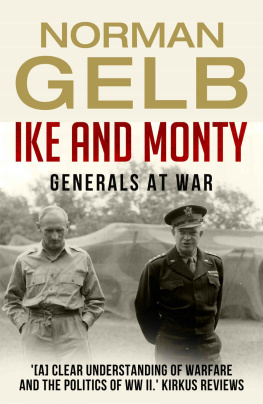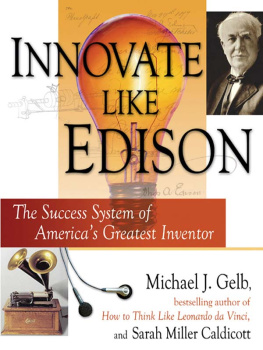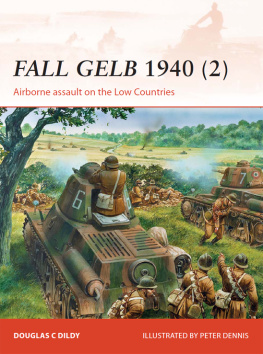Gelb - Ike and Monty: Generals at War
Here you can read online Gelb - Ike and Monty: Generals at War full text of the book (entire story) in english for free. Download pdf and epub, get meaning, cover and reviews about this ebook. year: 2018, publisher: Sharpe Books, genre: Non-fiction. Description of the work, (preface) as well as reviews are available. Best literature library LitArk.com created for fans of good reading and offers a wide selection of genres:
Romance novel
Science fiction
Adventure
Detective
Science
History
Home and family
Prose
Art
Politics
Computer
Non-fiction
Religion
Business
Children
Humor
Choose a favorite category and find really read worthwhile books. Enjoy immersion in the world of imagination, feel the emotions of the characters or learn something new for yourself, make an fascinating discovery.
- Book:Ike and Monty: Generals at War
- Author:
- Publisher:Sharpe Books
- Genre:
- Year:2018
- Rating:3 / 5
- Favourites:Add to favourites
- Your mark:
- 60
- 1
- 2
- 3
- 4
- 5
Ike and Monty: Generals at War: summary, description and annotation
We offer to read an annotation, description, summary or preface (depends on what the author of the book "Ike and Monty: Generals at War" wrote himself). If you haven't found the necessary information about the book — write in the comments, we will try to find it.
Gelb: author's other books
Who wrote Ike and Monty: Generals at War? Find out the surname, the name of the author of the book and a list of all author's works by series.
Ike and Monty: Generals at War — read online for free the complete book (whole text) full work
Below is the text of the book, divided by pages. System saving the place of the last page read, allows you to conveniently read the book "Ike and Monty: Generals at War" online for free, without having to search again every time where you left off. Put a bookmark, and you can go to the page where you finished reading at any time.
Font size:
Interval:
Bookmark:
Ike & Monty
Norman Gelb
Copyright Norman Gelb 1994
The right of Norman Gelb to be identified as the author of this work has been asserted by him in accordance with the Copyright, Designs and Patents Act, 1988.
First published in the United Kingdom in 1994 by Quill.
This edition published in 2018 by Sharpe Books.
For Mallary
Table of Contents
It is precisely the essence of military genius that it does not consist in a single appropriate gift courage, for example while other qualities of mind or temperament are wanting or are not suited to war. Genius consists in a harmonious combination of elements , in which one or the other ability may predominate, but none may be in conflict with the rest.
Carl von Clausewitz
*
By command I mean the generals qualities of wisdom, sincerity, humanity, courage and strictness.
Sun Tzu
*
The greatest general is he who makes the fewest mistakes.
Napoleon Bonaparte
Chapter One Ike and Monty
Statues erected to honor the memories of General Dwight Eisenhower and Field Marshal Viscount Montgomery of Alamein stand across town from each other in central London. Eisenhowers is on a plinth at a corner of Grosvenor Square, near the American embassy; Montgomerys on Whitehall, in front of the Ministry of Defence.
Depicted in battle dress and wearing the tank soldiers beret for which he was famous, Montgomery looks the warrior, ready to command his men in battle. In contrast, a stern-visaged Eisenhower, in dress uniform, is portrayed as the more exalted commander, removed not only from actual combat but even from the combat zone by his more important duties in masterminding victory over Nazi Germany in the Second World War. To that extent, those images are accurate. But there were important singularities to both these men that their statues do not perhaps cannot capture.
Dwight David Eisenhower and Bernard Law Montgomery were the most eminent Allied military figures during the war Eisenhower as Allied Supreme Commander and senior American general in Europe, Montgomery as the most celebrated British field commander. Together, they and the forces they commanded crushed the German armies in North Africa and Western Europe and, with the Soviets, went on to demolish Adolf Hitlers Third Reich.
It was a monumental achievement and earned them much acclaim. But theirs was a troubled collaboration. Eisenhower was conditioned by the military traditions and military capabilities of the United States, Montgomery by Britains very different traditions and capabilities. That they would sometimes disagree on fundamentals was to be expected. But their differences over strategy and tactics were compounded by personality and behavioral contrasts so profound that, though they spoke the same language, communication between them became an ordeal and their relationship grew strained almost to the point of rupture.
No great powers of perception were required to recognize how they differed in character and patterns of conduct. Eisenhower was open and gregarious. He had a ready, warm smile and a generally easy manner that charmed friends and strangers alike. He was modest, courteous, and straightforward.
Ike was personally liked by almost everyone with whom he dealt. Damn it, he complained. Montgomerys the only man in either army I cant get along with.
In contrast to Eisenhower, Montgomery was arrogant, conceited, boastful, abrasive, tactless, and capable of gross boorishness. He saw criticism of himself only as confirmation of the ineptitude of his critics. His personal behavior was at times an embarrassment to many other British generals and even to Winston Churchill, who once called him a little man on the make. Some of the Americans with whom he dealt came to abominate him.
Such a man could hardly have been expected to have made his way up through the British military hierarchy when many others less eccentric, and adhering to traditional codes of behavior, fell by the wayside. But Montgomery was a soldier with special qualities. He was an extraordinary leader of men, greatly respected by the officers who served under him and revered by his troops. He was known to possess, wrote the London Times , to an exceptional degree that magnetic and mysterious power to inspire confidence in his men.
Montgomery also had a superb grasp of tactics, as was demonstrated when he commanded the Allied invasion of Nazi-occupied Europe from across the English Channel, the most important single operation in the war. To his troops and to the British people generally, Monty was a heroic figure. He redeemed the battered reputation of the British Army and lifted the morale of the British people at a time when they were plagued by dread and despair.
His admirers endowed his slender, taut, five-foot-seven frame that intensely compacted hank of steel wire, George Bernard Shaw called him Others expressed doubts about that, maintaining that Montgomerys achievements were vastly exaggerated, by himself as well as by others.
However, few extravagant claims were made about Eisenhowers qualities as the leader of men in battle. Having never previously held even a junior combat command, he came under intense pressure during the war well beyond his experience. Montgomery scorned his military talents, summing him up as Nice chap; no general. The British High Command believed Eisenhower to be dangerously out of his depth as a commander of the Allied forces in the field. Even his friend, General Omar Bradley, who admired his achievements as chief executive officer of the most massive military campaign in history, doubted his ability to properly manage a battlefield in combat, a different matter altogether.
Nor was Eisenhower always as supremely confident as the general in charge was meant to be. He was often deeply anxious about his performance as top soldier of the western Allies. He later confessed to a lifelong hope that he wouldnt go into a blue funk
But no one, not even his critics, questioned Eisenhowers most momentous achievement in the war. As Supreme Allied Commander, he forged and managed the often-strained British-American military alliance and led it to victory over the armies of Nazi Germany. Churchills chief military adviser, Lord Ismay, called him the only man who could have made it work.
But Montgomery, his senior British subordinate, was a painful enigma to Eisenhower. He found dealing with him exasperating and infuriating, while Montgomery found serving under Eisenhower endlessly bewildering and frustrating. As generals at war, each had important qualities the other lacked that, had the two men been able to work together in harmony, might have compensated considerably for their respective limitations. Their discord made that impossible, with costly consequences in the most devastating conflict in human history.
Chapter Two Origins
Sahiwal, a city in central Pakistan, was once called Montgomery, after Field Marshal Montgomerys paternal grandfather, Sir Robert Montgomery. Sir Robert was a senior British official in the province of Punjab in the nineteenth century when Pakistan was still part of India. His act in disarming native troops at the start of the great Indian Mutiny against British colonial rule was credited with saving the metropolis of Lahore from the sort of massacres that occurred elsewhere in the Indian subcontinent at the time.
Bernard Law Montgomerys forebears on his mothers side could also claim eminence. In London, near Westminster Abbey, Dean Farrar Street, still so designated, was named after his maternal grandfather, Dean Frederic Farrar, a prominent nineteenth-century clergyman, educator, and writer.
No such illustrious figures featured in Eisenhowers genealogy. His forebears, who achieved neither fame nor influence, were originally from Germany. Their name was at first spelled Eisenhauer, which means hewer of iron. It indicates there may have been a blacksmith among the generals ancestors, though suggestions were made during the war that the name Eisenhauer might instead have originally referred to a warrior, one who metaphorically hammered the enemy. However, as far back as can be traced, the Eisenhauers were pacifist Mennonites who had emigrated to what was to become the United States before the American Revolution.
Next pageFont size:
Interval:
Bookmark:
Similar books «Ike and Monty: Generals at War»
Look at similar books to Ike and Monty: Generals at War. We have selected literature similar in name and meaning in the hope of providing readers with more options to find new, interesting, not yet read works.
Discussion, reviews of the book Ike and Monty: Generals at War and just readers' own opinions. Leave your comments, write what you think about the work, its meaning or the main characters. Specify what exactly you liked and what you didn't like, and why you think so.













